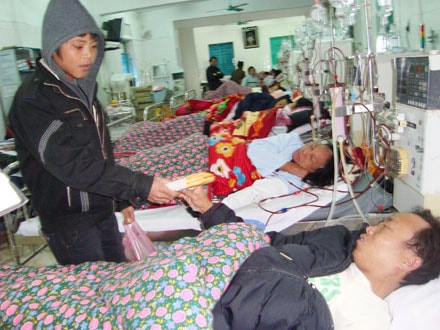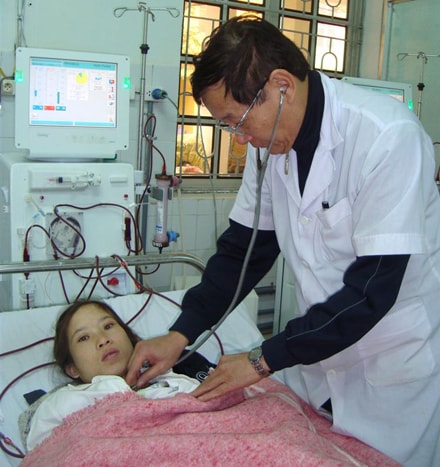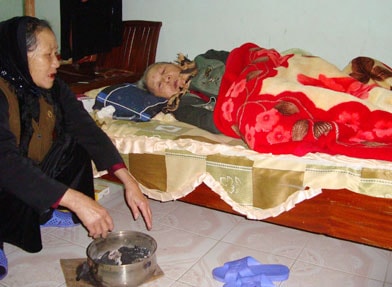Dialysis Patients - Pain and Desire to Live
(Baonghean) -Currently, the number of chronic kidney failure patients who have to undergo periodic hemodialysis in Nghe An province is quite large, of which the Department of Nephrology of Vinh Transport Hospital receives over 100 patients, the Department of Hemodialysis - Department of Emergency Resuscitation, Provincial General Hospital of Friendship has over 60 patients. Although almost all of their time and health have been taken away, the hemodialysis patients we met in this life-and-death battle have overcome pessimism and despair to nurture hope and optimism.
We met the dialysis patients at the two hospitals mentioned above, when they were lying on hospital beds with pale faces, in damp rented houses smelling of antibiotics... to hear about their lives, their bitter feelings, and their extremely small, simple wishes...
Scenes of life in the "kidney neighborhood"
Around these two hospitals, there have long been boarding houses for dialysis patients. Around the GTVT hospital, people pointed out to us 3 such “neighborhoods”. Each boarding house is about 10-12 m2.2, can be the residence of 1 to 3 patients. Determining that fighting this disease is a long process, depending a lot on economic conditions, so the dialysis patients are very frugal in spending and living. They all consider that small rented room as their home.

Mr. Thai Khac Dan and his mid-dialysis meal.
Mr. Thai Khac Dan was born in 1975, from Ky Tan, Tan Ky has had 7 years of "seniority" in dialysis and 5 years of living in a rented room opposite the Traffic Hospital (formerly a motel of Nghe Tinh Non-ferrous Metal Company) with the price of 600,000 VND/room for 3 people. For a long time, Mr. Dan has not returned to his hometown. Last year, his father passed away, he only came back to mourn for a few days and then hurried back. His family has an old mother, his siblings are all in difficult circumstances, he himself has not yet gotten married but has a terminal illness, he is fighting the disease alone.
The corner of his bed is a small world, a place to keep memories and to confide all joys and sorrows. He hangs there a photo of his time in the army, an old, worn guitar, and cheerful magazine pages. He often looks at his world, sometimes plays a few sounds and wishes to live. He once witnessed his former roommate faint in his arms and leave this life when he had just rushed to the hospital. The wish to live always arises strongly, it is much bigger than when he is depressed and gives up. He and Mr. Ho, Mr. Que (2 roommates), every day after dialysis hours, use Mr. Que's old motorbike to work as a motorbike taxi in front of the hospital gate. Not only to earn more money, but the higher purpose is that they also help many other patients in the same situation when they have difficulty with transportation.
Le Quang Trung, born in 1988, from Cam Xuyen, Ha Tinh, has also had 4 years of dialysis at the Traffic Hospital. After 10th grade, he had to drop out of school to join the dialysis community. He also rented a house, fought the disease alone, and every month took the bus to Cam Xuyen to get more rice and salt, but there was always an innocent smile on his face. He said he was used to living alone, used to the hospital, and considered the aunts and uncles who were doing dialysis here as relatives. He often ran back and forth to help the aunts and uncles who were weaker than him buy a piece of bread, a carton of milk, or call the doctor when needed...

Taking care of dialysis patients at Nghe An General Hospital.
Or like Ms. Phan Thi Ngan from Yen Thanh, a patient on dialysis at NA General Hospital, is also in a very sad situation. She got married late, after a year her husband died of cancer, her child was born with congenital liver and gallbladder disease, now 14 years old and is an outpatient at the National Children's Hospital. She had to leave her child with her grandmother (the wife of a martyr), she came here for dialysis and rented a room near Hung Dung market (Vinh) with another person for 500,000 VND a month. She has not been able to see her child for several months because her illness is getting worse, and when she is well, she has to take advantage of the time to collect more scrap metal to earn money for medicine.
There are many more, similar lives, like Mr. Liem, Mr. Thiep who have been with the hospital for 10 years. Or like the case of Nguyen Van Lam born in 1988, from Nghia Loc, Nghia Dan, whose child was only 2 months old when he followed his mother to dialysis with his father; Mrs. Nguyen Thi Hong also had dialysis and collected bottles, once almost died by the train tracks while running to collect water bottles...
Stick with life
Dialysis patients are mainly poor, but according to the patients and doctors here, this disease will turn rich people into poor, and average people into exhausted. An average patient has to undergo dialysis 3 times a week (4 hours each time) to maintain life. Patients have insurance but non-kidney drugs must be purchased from outside. Patients with kidney failure will lead to multiple organ failure and other diseases, so the feeling of helplessness in the face of the disease, becoming a burden, and not receiving care from relatives, is understandable.

It is rare for kidney patients to be cared for in such luxurious accommodations.
However, the dialysis patients we met, in this life-and-death battle, they overcame pessimism and despair to learn to nurture hope and optimism. Their joy is to meet each other every day, talk, share a piece of bread, drink a pot of hot tea together, and have relatives come to visit. And they also find many ways to earn a living, have money for medicine, and not become a burden on their families, even though this is extremely difficult. Besides, they always know how to rely on, love, help and encourage each other.
Talking to us, Dr. Manh (Head of the Kidney Department - Traffic Hospital), Dr. Phan Trong Hoa (Deputy Head of the Emergency Resuscitation Department - Hanoi General Hospital) both said: Every day, having to witness heartbreaking situations, seeing the patients' desire to live, the doctors and nurses in the department all remind themselves to improve the quality of service, to truly be the ones to share with them in their illnesses as well as in their lives. There are many patients here who do not have relatives or visitors after long days in the hospital because everyone is tired and exhausted. Therefore, kidney patients are allowed to call the doctor at any time and receive help. In addition to the efforts from the hospital such as investing in synchronous machinery for the kidney department, training the medical team, supporting an extra meal for dialysis patients every day, the doctors and nurses also hope that there will be more support policies and more charitable organizations to come to these patients.
Thuy Vinh
